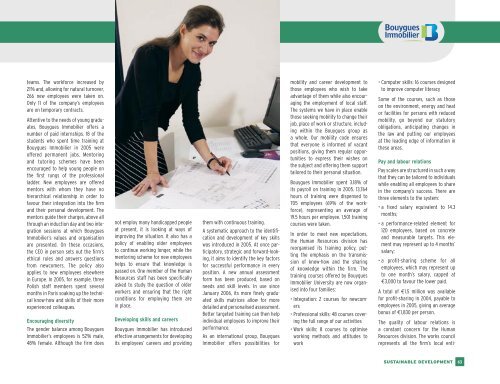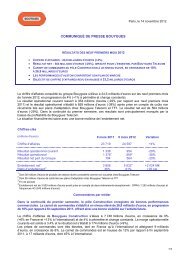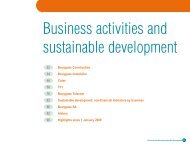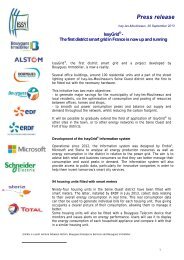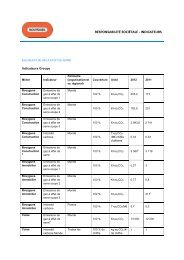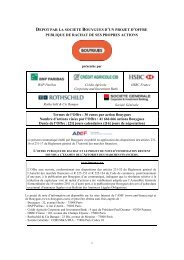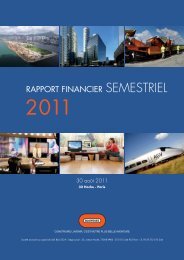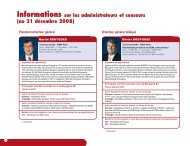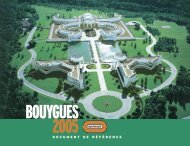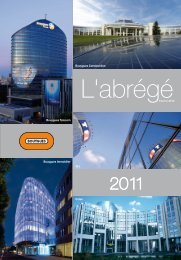A N N U A L R E P O R T - Bouygues
A N N U A L R E P O R T - Bouygues
A N N U A L R E P O R T - Bouygues
Create successful ePaper yourself
Turn your PDF publications into a flip-book with our unique Google optimized e-Paper software.
teams. The workforce increased by<br />
21% and, allowing for natural turnover,<br />
266 new employees were taken on.<br />
Only 11 of the company’s employees<br />
are on temporary contracts.<br />
Attentive to the needs of young graduates,<br />
<strong>Bouygues</strong> Immobilier offers a<br />
number of paid internships. 18 of the<br />
students who spent time training at<br />
<strong>Bouygues</strong> Immobilier in 2005 were<br />
offered permanent jobs. Mentoring<br />
and tutoring schemes have been<br />
encouraged to help young people on<br />
the first rungs of the professional<br />
ladder. New employees are offered<br />
mentors with whom they have no<br />
hierarchical relationship in order to<br />
favour their integration into the firm<br />
and their personal development. The<br />
mentors guide their charges, above all<br />
through an induction day and two integration<br />
sessions at which <strong>Bouygues</strong><br />
Immobilier’s values and organisation<br />
are presented. On these occasions,<br />
the CEO in person sets out the firm’s<br />
ethical rules and answers questions<br />
from newcomers. The policy also<br />
applies to new employees elsewhere<br />
in Europe. In 2005, for example, three<br />
Polish staff members spent several<br />
months in Paris soaking up the technical<br />
know-how and skills of their more<br />
experienced colleagues.<br />
Encouraging diversity<br />
The gender balance among <strong>Bouygues</strong><br />
Immobilier’s employees is 52% male,<br />
48% female. Although the firm does<br />
not employ many handicapped people<br />
at present, it is looking at ways of<br />
improving the situation. It also has a<br />
policy of enabling older employees<br />
to continue working longer, while the<br />
mentoring scheme for new employees<br />
helps to ensure that knowledge is<br />
passed on. One member of the Human<br />
Resources staff has been specifically<br />
asked to study the question of older<br />
workers and ensuring that the right<br />
conditions for employing them are<br />
in place.<br />
Developing skills and careers<br />
<strong>Bouygues</strong> Immobilier has introduced<br />
effective arrangements for developing<br />
its employees’ careers and providing<br />
them with continuous training.<br />
A systematic approach to the identification<br />
and development of key skills<br />
was introduced in 2005. At once participatory,<br />
strategic and forward-looking,<br />
it aims to identify the key factors<br />
for successful performance in every<br />
position. A new annual assessment<br />
form has been produced, based on<br />
needs and skill levels. In use since<br />
January 2006, its more finely graduated<br />
skills matrices allow for more<br />
detailed and personalised assessment.<br />
Better targeted training can then help<br />
individual employees to improve their<br />
performance.<br />
As an international group, <strong>Bouygues</strong><br />
Immobilier offers possibilities for<br />
mobility and career development to<br />
those employees who wish to take<br />
advantage of them while also encouraging<br />
the employment of local staff.<br />
The systems we have in place enable<br />
those seeking mobility to change their<br />
job, place of work or structure, including<br />
within the <strong>Bouygues</strong> group as<br />
a whole. Our mobility code ensures<br />
that everyone is informed of vacant<br />
positions, giving them regular opportunities<br />
to express their wishes on<br />
the subject and offering them support<br />
tailored to their personal situation.<br />
<strong>Bouygues</strong> Immobilier spent 3.18% of<br />
its payroll on training in 2005. 13,764<br />
hours of training were dispensed to<br />
705 employees (69% of the workforce),<br />
representing an average of<br />
19.5 hours per employee. 1,501 training<br />
courses were taken.<br />
In order to meet new expectations,<br />
the Human Resources division has<br />
reorganised its training policy, putting<br />
the emphasis on the transmission<br />
of know-how and the sharing<br />
of knowledge within the firm. The<br />
training courses offered by <strong>Bouygues</strong><br />
Immobilier University are now organised<br />
into four families:<br />
• Integration: 2 courses for newcomers<br />
• Professional skills: 48 courses covering<br />
the full range of our activities<br />
• Work skills: 8 courses to optimise<br />
working methods and attitudes to<br />
work<br />
• Computer skills: 16 courses designed<br />
to improve computer literacy<br />
Some of the courses, such as those<br />
on the environment, energy and heat<br />
or facilities for persons with reduced<br />
mobility, go beyond our statutory<br />
obligations, anticipating changes in<br />
the law and putting our employees<br />
at the leading edge of information in<br />
these areas.<br />
Pay and labour relations<br />
Pay scales are structured in such a way<br />
that they can be tailored to individuals<br />
while enabling all employees to share<br />
in the company’s success. There are<br />
three elements to the system:<br />
• a fixed salary equivalent to 14.3<br />
months;<br />
• a performance-related element for<br />
120 employees, based on concrete<br />
and measurable targets. This element<br />
may represent up to 4 months’<br />
salary;<br />
• a profit-sharing scheme for all<br />
employees, which may represent up<br />
to one month’s salary, capped at<br />
€3,000 to favour the lower paid.<br />
A total of €1.5 million was available<br />
for profit-sharing in 2004, payable to<br />
employees in 2005, giving an average<br />
bonus of €1,830 per person.<br />
The quality of labour relations is<br />
a constant concern for the Human<br />
Resources division. The works council<br />
represents all the firm’s local enti-<br />
SUSTAINABLE DEVELOPMENT<br />
63


